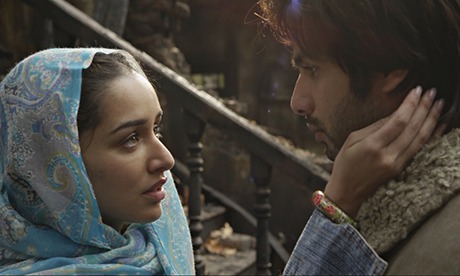
Ophelia is a young journalist, Polonius a sinister policeman and Laertes works for a multinational. The climactic duel is a firefight in a snowy graveyard, and the famous "play within a play" features rows of synchronised dancers and much singing. Welcome to Haider, a Bollywood version of Hamlet set for a controversial, much anticipated release this autumn.
The film is the work of the local director Vishal Bhardwaj, whose vision of Macbeth as an Indian gang boss won international critical praise. His latest Shakespearian adaptation turns the Prince of Denmark into a philosophy student from Kashmir, the former Himalayan princedom, who returns home from university after hearing that his doctor father has disappeared and his mother is in a new relationship.
"Shakespeare is the most dramatic writer for hundreds of years. His stories of conflicts are relevant today and relevant everywhere," said Bhardwaj, 48, who has also directed an adaptation of Othello.
The film stars some of India's biggest names, including Irrfan Khan, who played a policeman in the Oscar-winning Slumdog Millionaire, and Tabu, known internationally for her role in The Life of Pi.
It is likely to be controversial however. Set during the 1990s, the most intense years of the ongoing insurgency which has pitted Kashmiri militants and separatists against security forces and their local auxiliaries for more than two decades, Haider includes graphic scenes of torture in Indian army camps and other human rights abuses by Indian officials. The father of Hamlet, or Haider, turns out to have been killed by paramilitaries recruited by the Indian authorities and run by his uncle. Rosencrantz and Guildenstern are local men who are paid informants for police intelligence.
Violence in Kashmir, disputed by India and Pakistan since the two countries won their independence from Britain in 1947, has ebbed in recent years, but extreme sensitivities remain in India about the conflict and its history.
"What happened in Kashmir is a very human tragedy, but no one is talking about it. But once you talk of it, you are released from it. What I am saying is the truth. It should be like a balm on a wound," said Bhardwaj.
The film will have to pass India's government censors and could prompt a backlash from rightwing organisations which have previously targeted artists whose work they say is unpatriotic.
The adaptation has been written by Basharat Peer, a Kashmir-born author and journalist. Hamlet's famous soliloquies have had to be largely omitted, but the most famous scenes remain. Haider asks "to be or not to be" as he points a handgun to his own head, and as a Muslim decides not to kill his uncle while he is kneeling in prayer, rather than before an altar.
Peer said he hoped the film would challenge the narrative constructed by previous mainstream cinema about the Kashmir conflict and give an alternative point of view.
"Kashmiris have always been portrayed as crazy fanatics or Kashmir simply seen as a picturesque tourist destination. This is a very different view," he said.
Bollywood directors have frequently turned to Shakespeare for inspiration. One recent blockbuster was based on Romeo and Juliet, and another on A Midsummer Night's Dream. The classic 1982 film Angoor adapted A Comedy Of Errors.
The contemporary interest in Shakespeare in India is part of a long tradition reaching back to the 19th century, when popular theatre troupes performed his plays, said Rachel Dwyer, professor of Indian cultures and cinema at the University of London. Film-makers also adapted his work during the colonial period of British rule.
"The more realistic films [such as the new Hamlet adaptation] with more narrative appeal more to the Indian elite and a lot of them will have read Shakespeare. The tragedies particularly are about people facing these very big, very universal dilemmas and that speaks to everyone," Dwyer said.
Adapting a play set in Denmark and written by an English playwright four centuries ago to contemporary India was not easy, Peer said.
"There were lots of difficulties. You can't just transpose a play. You have to do it justice, but also do justice to the context," he said.
Social as well as political subjects in the play, and the film, may raise eyebrows, particularly the relationship between Gertrude and her son, played by rising star Shahid Kapoor.
"Coming back to Oedipus … the characters of Shahid and Tabu will be having a very complex sexual relationship. Giving this situation, it will be interesting to see how the audience react to this kind of a relationship on-screen," said the Deccan Chronicle, a regional Indian newspaper.

